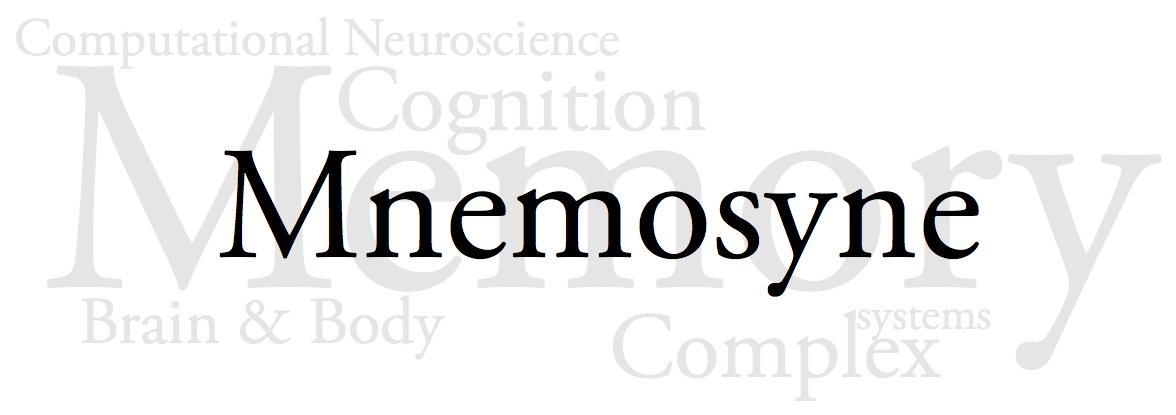

Frédéric Alexandre |
 |
| Address: | ALEXANDRE Frédéric
MNEMOSYNE team - Inria Bordeaux Institut des Maladies Neurodegeneratives CNRS UMR 5293 - Batiment NeuroCampus 3eme etage 146 Rue Leo Saignat - CS 61292 - Case 28 33076 Bordeaux FRANCE |
| Mobile: | (33/0) 6 30 38 71 94 |
| Phone: | (33/0) 5 33 51 48 02 |
| email: | Frederic.Alexandre@inria.fr |
| Secretary: | Anne-Lise PERNEL (anne-lise.pernel@inria.fr (33/0) 5 24 57 40 41)
Centre de Recherche Inria de l'université de Bordeaux 200 avenue de la vieille tour Bureau B336 33405 Talence Cedex FRANCE |
Concerning computational neuroscience, I explore the structure/function relations in the brain and the links, at several levels of description, between biologically inspired neural architectures and functioning and learning principles. At the level of the population of neurons, I study adapted elementary mechanisms of neuronal functioning and learning. At the level of information flows, I design models of cerebral structures including the posterior and prefrontal cortex, cerebellum, basal ganglia, thalamus, amygdala, hippocampus with application to perceptive scene interpretation, planning and the related various aspects of memorization. A major challenge concerns exchanges of information and transfer of learning between the neuronal structures.
Concerning cognitive modeling, I am interested in adaptive behavior for autonomous robotics. My main reference frameworks are embodied cognition and enaction, and I aim at building a global model of the cognitive architecture to study how a variety of functions ranging from perceptive analysis and sensorimotor coordination to executive functions and consciousness are built by interaction with the inner (emotional) and the outer (physical) world. These studies exploit the above-mentioned neural systems but also my other fields of expertise related to machine learning, pattern recognition, data, image and signal processing and neuro-control.
Concerning neuroscience and the medical domain, I work in the Bordeaux Neurocampus and have other national and international collaborations to feed the loop of interactions, building models from data and knowledge in these domains and assessing and exploiting them for the study of neuronal mechanisms and structures, animal and human behavior and neurodegenerative diseases.
At the frontier between Artificial Intelligence and Computational Neuroscience, the Mnemosyne team proposes to model the main forms of memory and learning in the brain and to study how they are organized and implement complex cognitive functions. In neuroscience, a major dichotomy is reported between explicit (e.g. semantic, episodic) and implicit (e.g. procedural, habitual) memories and learning. Key mechanisms to understand such cognitive functions as reasoning, decision making, attentional processes, creative problem solving and language rely on competition, cooperation and transfer between these different ways to learn and memorize information: they are presently the topic of major progresses in different fields of neuroscience.
The Mnemosyne team designs models of the underlying neuronal structures and circuits under this functional view of brain organization and dynamics. Models are based on different kinds of neural architectures (feedforward, recurrent, convolutional, generative) with the challenge of mimicking the loops between the prefrontal cortex and the basal ganglia, and their interactions with the sensory cortex, hippocampus, amygdala and other cerebral structures, reported to be the substratum for the targeted cognitive functions. These models are the bases for collaborations of the team with the neuroscience and medical communities; they are also the ground for its original positioning in Machine Learning, towards Artificial General Intelligence. The team considers it a major challenge to propose computational models, embodied into virtual or real agents interacting on-line with the environment, and able to autonomously extract structures to build a distributed model of the world, flexibly select the best strategy to reach internal and external goals and learn from their errors.
Recent topics of investigation concern language acquisition and the extraction of syntax, goals and rules encoding in motivated behavior, transfer from goal-directed to habitual behavior, planning and reasoning with a working memory and retrospective and prospective deliberation. These models are built in tight interaction with neuroscientists, in association with experimental protocols; they are exploited to consider pathological cases in the medical domain. They are also transferred to the socio-economic world with industrial applications and their impact in social science and humanities is also actively investigated, particularly in joint projects with education science, linguistics, economics and philosophy.